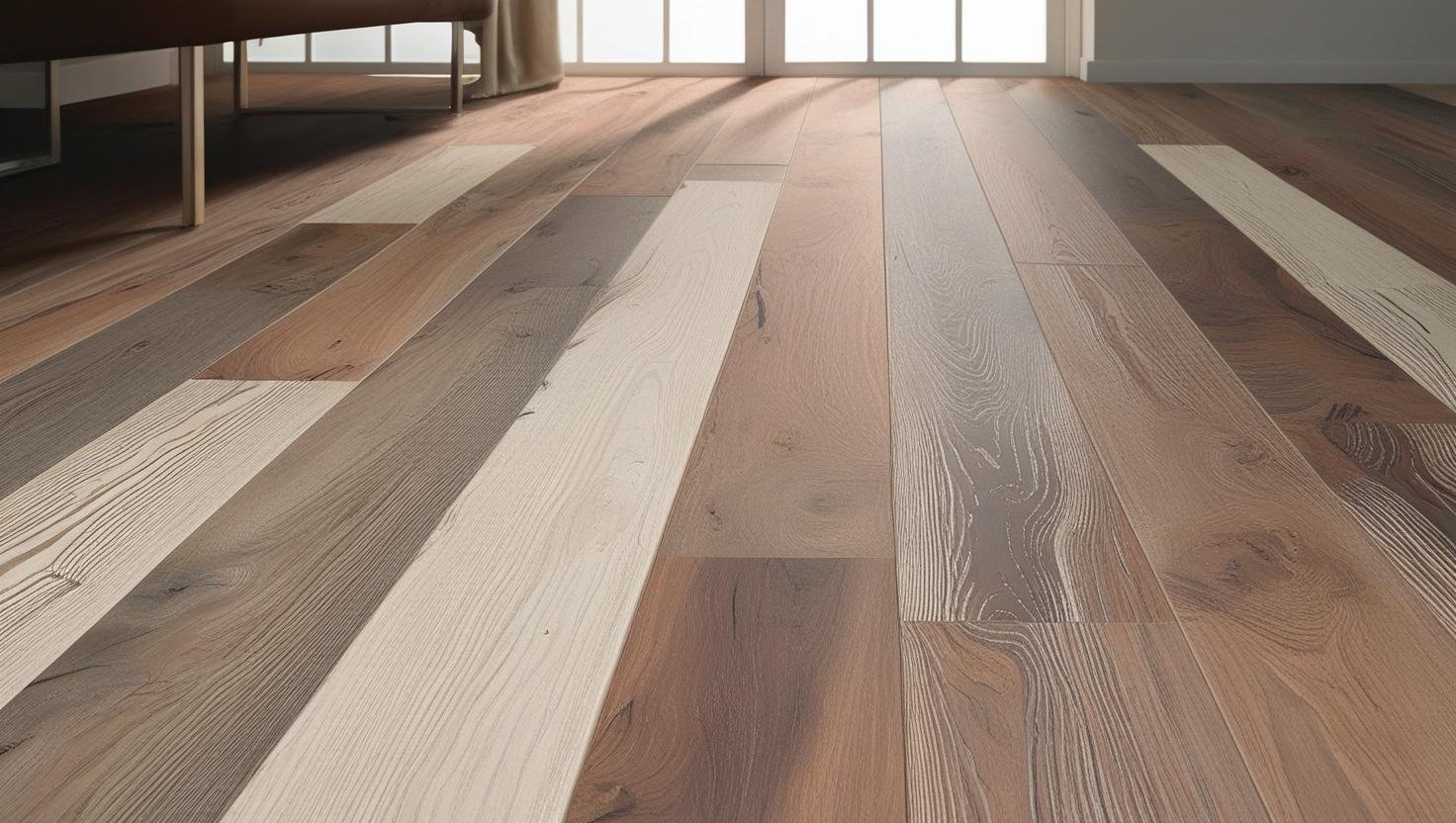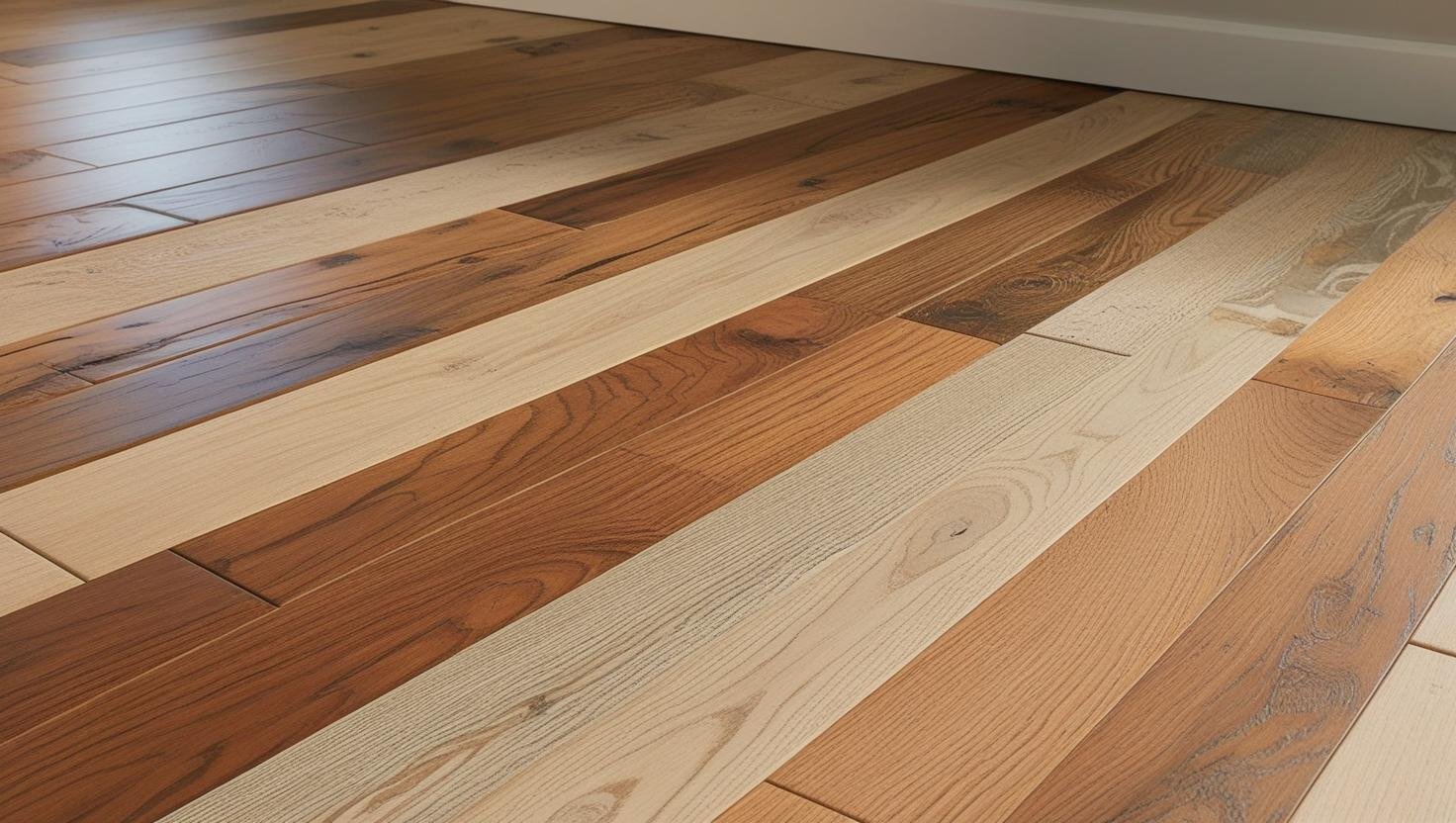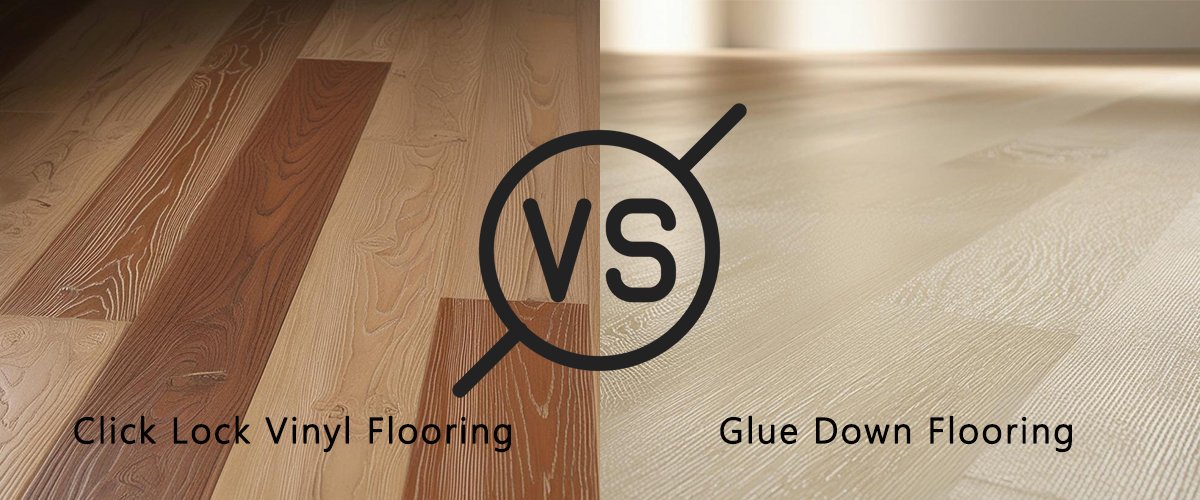Choosing the right flooring can be hard, especially when deciding between click-lock flooring and glue-down flooring. Both have their pros and cons. This article will help you compare these two types of flooring, so you can choose the best one for your home.
[lwptoc]
What is Click Lock Flooring?
Click lock flooring is a type of flooring where the planks snap together using a special locking system. You don’t need glue, nails, or staples to install it. It’s very easy to put together. Click lock flooring is often used for luxury vinyl planks (LVP), laminate flooring, SPC flooring (Stone Plastic Composite), and engineered wood. The floor “floats” on top of the subfloor, meaning it doesn’t need to be glued down.

Benefits of Click Lock Flooring
Easy and Quick Installation
One of the biggest advantages of click-lock flooring is that it’s easy to install. You don’t need glue or nails, and you can do it yourself. This saves you time and money. Click-lock flooring can be installed much faster than glue-down flooring, so it’s perfect for people who want to do the job quickly.
Waterproof
Many click-lock flooring options, especially SPC flooring, are waterproof. This makes it perfect for wet areas like bathrooms, kitchens, and basements. SPC flooring won’t warp or bend when it gets wet, so it’s great for places that have a lot of moisture.
No Drying Time
Unlike glue-down flooring, you don’t have to wait for glue to dry with click-lock flooring. You can walk on it as soon as you’re done installing, which saves time.
Easy to Replace
If a plank gets damaged, it’s easy to replace. You can remove the damaged plank and put in a new one without having to take out the whole floor. This makes repairs cheaper and faster than with glue-down flooring.
Drawbacks of Click Lock Flooring
Movement Over Time
Click-lock flooring can sometimes shift or expand, especially if the subfloor is uneven or if the temperature changes a lot. This can create small gaps between the planks. To avoid this, the subfloor needs to be smooth and well-prepared before installation.
Noise
Click-lock flooring can make a hollow sound when walked on, especially in multi-story buildings. To reduce noise, you may need to add an underlayment underneath the flooring. Underlayment can help reduce sound by up to 60%.
Needs a Flat Subfloor
For click-lock flooring to work properly, the subfloor must be flat. If the subfloor has bumps or holes, it can cause the planks to fit poorly, leading to gaps or shifting.
What is Glue Down Flooring?
Glue-down flooring is a method where the planks are glued directly to the subfloor. It’s often used for luxury vinyl tiles (LVT), hardwood, and SPC flooring. Unlike click-lock flooring, which floats above the subfloor, glue-down flooring is bonded directly to the subfloor, making it more stable.

Benefits of Glue Down Flooring
More Stable
Glue-down flooring is more stable than click-lock flooring. The adhesive keeps the planks in place, so they don’t shift over time. This makes it a better choice for areas with high foot traffic or spaces that need extra durability.
Better Sound Insulation
Glue-down flooring provides better soundproofing than click-lock flooring. Since the planks are glued to the subfloor, it helps absorb sound and reduces noise. This makes glue-down flooring a good choice for apartments or multi-story buildings.
Works on Uneven Subfloors
If your subfloor isn’t perfectly flat, glue-down flooring can still work well. The glue fills in small imperfections and helps create a smooth surface.
No Gaps or Shifting
Once installed, glue-down flooring won’t shift or develop gaps. This makes it very stable and ensures a smooth, long-lasting surface.
Drawbacks of Glue Down Flooring
Longer Installation Time
Glue-down flooring takes longer to install than click-lock flooring. The glue needs time to dry, and the process can be messier. It usually takes one to three days to install glue-down flooring, depending on the size of the area and drying time.
Mess and Odor
Using glue can create a mess, and the adhesive may have a strong smell while it dries. You will need to wait for it to dry before walking on the floor.
Harder to Replace
If you need to replace glue-down flooring, it is more difficult. The adhesive bonds strongly to the subfloor, which makes it harder to remove the planks. This can make repairs more difficult and expensive compared to click-lock flooring.
Click Lock Flooring vs Glue Down Flooring: A Quick Comparison

Here’s a quick comparison to help you decide which flooring is better for you:
| Category |
Click Lock Flooring |
Glue Down Flooring |
| Installation Process |
Quick and easy. No adhesive is needed, DIY-friendly. |
Slower. Needs professional installation and drying time. |
| Cost |
It’s cheaper because it’s faster to install. |
It is more expensive because of adhesive and installation time. |
| Durability and Stability |
It can shift and expand over time. |
More stable and durable, great for high-traffic areas. |
| Maintenance and Repairs |
Easy to repair; planks can be replaced individually. |
Harder to repair; may need to replace the entire floor if damaged. |
| Sound Insulation |
May need extra underlayment to reduce noise. |
Better soundproofing due to direct bonding to the subfloor. |
| Moisture Resistance |
Water-resistant, good for wet areas. |
Depends on the glue; some adhesives may get damaged by moisture. |
Which One is Right for You?
DIY or Professional Installation
If you want to do the work yourself, click-lock flooring is the better choice. It’s easy to install without any glue or special tools. If you prefer a professional to install the floor, then glue-down flooring might be better.
High-traffic Areas
For areas with a lot of foot traffic, glue-down flooring is the better option because it’s more stable and durable.
Moisture-Prone Areas
If you need flooring for wet places like bathrooms or basements, click-lock flooring is better. It’s water-resistant and won’t get damaged by moisture.
Soundproofing Needs
For soundproofing, glue-down flooring works better. It stays glued to the subfloor, so it reduces noise more effectively than click-lock flooring.
Conclusion
Both click-lock flooring and glue-down flooring are great choices. If you need a quick, easy, and moisture-resistant floor, click-lock flooring is your best bet. If you need extra durability, stability, and better soundproofing, glue-down flooring may be the right option.
Think about your space, budget, and needs before making a decision. Both types of flooring can work well in the right situation.
FAQs:
What’s the difference between click-lock flooring and glue-down flooring?
Click-lock flooring is easy to install without glue. Glue-down flooring needs adhesive to stick to the subfloor.
Is click-lock flooring good for bathrooms and kitchens?
Yes, click-lock flooring, especially SPC flooring, is water-resistant and perfect for wet areas like bathrooms and kitchens.
Can I install click-lock flooring by myself?
Yes, click-lock flooring is easy to install, and you can do it yourself.
Is glue-down flooring better for high-traffic areas?
Yes, glue-down flooring is more durable and stable, making it better for busy areas.
How long does glue-down flooring take to install?
It usually takes one to three days to install glue-down flooring.
What are the benefits of glue-down flooring?
Glue-down flooring is more stable, better for soundproofing, and works well in high-traffic areas.
Can I install glue-down flooring on an uneven subfloor?
Yes, glue-down flooring works well on slightly uneven subfloors because the glue fills small gaps.
How do I clean click-lock flooring?
Sweep or mop it with a damp cloth to keep it clean. Don’t use too much water or harsh cleaners.
Can I replace a damaged plank in click lock flooring?
Yes, you can easily replace a damaged plank without replacing the whole floor.
Does glue-down flooring need maintenance?
Glue-down flooring needs minimal maintenance. Just clean it regularly and check for any moisture problems.
















